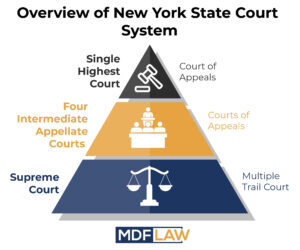Commercial Litigation
Our attorneys have experience handling complex commercial litigation matters in state and federal court in New York. Commercial disputes are a type of civil litigation that involves relationships between businesses or complex disputes between individuals.
These are some examples of commercial litigation that we handle include:
- Partnership disputes
 Shareholder lawsuits
Shareholder lawsuits- LLC lawsuits
- Securities litigation
- Real estate disputes
- Breach of contract cases
- Fraud claims
- Disputes involving mergers and acquisitions and other corporate actions
- Whistleblowers and
- Securities litigation.
Three Basic Levels of the NYS Court System
- The Supreme Court, despite its name, is the lowest level court in NYS. It is a court of general jurisdiction that hears trials.
- Above the Supreme Court are the four Appellate Divisions (numerated by Department).
- Above the four Appellate Divisions is the Court of Appeals, which is the highest court in New York State.
The New York Commercial Division is part of the New York State Supreme Court and was created to handle complicated commercial cases in their respective jurisdictions. There are specific rules that apply for a case to be handled by the Commercial Division. These rules are as follows.
Monetary Thresholds
The jurisdictional thresholds to qualify for the Commercial Division vary by county. Here are the limits as of 2021 within the following counties. These limits may change frequently depending on caseload.
- Nassau $200,000
- Suffolk $100,000
- Westchester $100,000
- Onondaga $50,000
- Queens $100,000
- Kings (Brooklyn) $150,000
- New York (Manhattan) $500,000

Investor Lawsuits: Don’t Get Burned By Life Settlements
Life settlements, sometimes called Senior Settlements, have been more aggressively promoted in recent years leading to many investor lawsuits. They can offer high earnings for

Securities Fraud Lawsuit Filed Against Akebia Therapeutics, Inc. (AKBA)
A securities fraud lawsuit has been filed against Akebia Therapeutics, Inc. (NASDAQ: AKBA) for potential securities violations on behalf of shareholders who purchased shares anytime

Did You Invest in Zima Digital Assets Through Art Hoffman?
Former Glendale, Arizona broker Art Hoffman (CRD# 3193754) has been named in a Securities and Exchange Commission (SEC) complaint alleging he defrauded his clients. According

Protecting Yourself From a Bitcoin Ponzi Scheme
Bitcoin Ponzi schemes hit an all-time high in 2021 compared to a year earlier, hitting a record-high of 14 billion in total crypto assets stolen
Commercial Cases
- Breach of a contract or fiduciary duty fraud, misrepresentation, business tort, statutory or common law actions where the breach alleged arises out of business dealings
- Transactions included in the Uniform Commercial Code, except those involving cooperatives or condominium units
- Transactions involving commercial real property, such as Yellowstone injunctions, but excluding actions that only involves rent payments
- Business transactions involving or arising out of dealings with financial institutions, including commercial banks
- Internal affairs of business organizations
- Malpractice complaints against accountants, actuaries, and legal malpractice arising out of representation in commercial matters
- Environmental insurance coverage
- Commercial insurance coverage
Under the rules of the commercial division, the following cause of actions do not have to meet the monetary threshold listed above:
- Shareholder derivatives action
- Commercial class actions
- Dissolution of corporations, partnerships, LLCs, LLPs, and joint ventures
Non-Commercial Cases
Generally, the Commercial Division would not handle non-commercial causes of actions even if they meet the monetary threshold. These non-commercial causes of actions may include:
- Lawsuits to collect professional fees
- Cases seeking a declaratory judgment as to insurance coverage for personal injury or property damage
- Residential real estate disputes, including landlord-tenant, commercial real estate disputes on rent payment only
- Home improvement contracts for residential property for up to four residential units or individual units in a residential building, including cooperatives and condominiums
- Proceedings to enforce a judgment regardless of the nature of the underlying case;
- First-party insurance claims and actions by insurance to collect premiums or rescind non-commercial policies; and
- An attorney malpractice action unless they arose out of representation in a commercial matter.
Assignment to the Commercial Division
Suppose a party wishes to get the case assigned to the Commercial Division. In that case, that party must do so by filing a Request for Judicial Intervention (RJI) and a completed Commercial Division RJI Addendum that certifies that the case meets the monetary threshold the cause of action set by the jurisdiction. Failure to file an RJI precludes a party from seeking assignment of the case to the Commercial Division.
The parties to the complaint may also consent to the exclusive jurisdiction of the Commercial Division of the Supreme Court. Parties can do this by stating so in their choice of law or provision sections of the contract. As noted above, this is only permissible if the case has met both the monetary threshold and cause of action.
The request for assignment to the Commercial Division must be made within 90 days of the services of the complaint.
Transfer Into the Commercial Division
Moreover, the non-commercial division justice handling the case may request the Administrative judge to transfer the case to the commercial division, provided that it meets the money threshold and cause of action.
Note that the Administrative Judge’s decision regarding this transfer is considered final and not subject to further administrative appeal.
Transfer From the Commercial Division
Moreover, a party that is aggrieved by a transfer of a case to a non-commercial part of the court may ask the Administrative judge to review the transfer by filing a letter application within ten days of the receipt of the case’s designation to a non-commercial part.
Similar to the situation listed above, the ruling of the Administrative judge regarding the transfer of the case is final and not subject to further administrative appeal.
